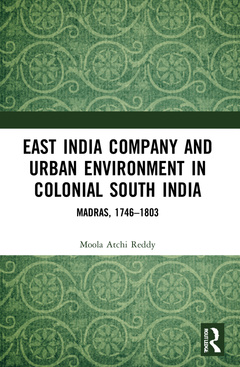East India Company and Urban Environment in Colonial South India Madras, 1746–1803
Auteur : Reddy Moola Atchi

This book makes a pioneering attempt to analyse the linkages between the rule of East India Company and urban environment in colonial India over more than a half-century - from 1746 to 1803 - through a study of the city of Madras (present Chennai).
The book traces urban development in colonial South India from a broad economic history point of view and with a focus on its environmental dimension, covering the period from the First Carnatic War until the 18th century by which time the English East India Company had consolidated its power. It discusses themes such as urban development; infrastructural development; housing and buildings, city and suburbs; and development of land and roads in the colonial period. Using extensive archival resources, it offers new insights on the various aspects of the shifting urban physical environment and captures the development of Madras city limits; road infrastructure, building of paved streets, whitewashed walls and compounded houses; establishment of garden houses; use of land resources; development of masonry bridges by merchants; housing problems; and the building of Fort House, Garden House, Admiralty House, Pantheon House, Custom House, etc. in Madras, to describe the impact of colonialism on urban environment.
An important contribution to the history of urban economics and environment, this book with its lucid style and rich illustrations will be an essential read for scholars and researchers of colonial history, modern Indian history, environmental history, urban environment, urban history, political economy, urban economic history, Indian history, and South Asian studies.
1. Introduction 2. Growth 3. Gardens 4. Lands 5. Roads 6. Housing 7. Buildings 8. Conclusions
Moola Atchi Reddy is a former Professor of the Department of Economics, School of Social Science, University of Hyderabad, Telangana, India. Joining as the first faculty member in 1979, he retired as professor in 2006 after serving for nearly 27 years. He is recipient of meritorious medals from the Department of Economics, Andhra University. He was a research assistant for the project on the Cambridge Economic History of India, Vol.2, ed. Dharma Kumar (1982). With a PhD in economic history from the Delhi School of Economics, he has worked at Ford Foundation, New Delhi, and Sri Venkateswara University (1976–8). He has published two books: Lands and Tenants in South India: A Study of Nellore District, 1850–1990 (1996); and Trade and Commerce of the East India Company in India (Madras) (2006). Several of his articles have been published in refereed journals and edited books in addition to over 100 partly and unpublished papers read in conferences, seminars, and workshops. His research interests are in studies of colonial Madras.
Date de parution : 09-2023
15.6x23.4 cm
Date de parution : 09-2021
15.6x23.4 cm
Thème d’East India Company and Urban Environment in Colonial... :
Mots-clés :
Garden Houses; Colonial South India; Madras; Black Town; Economic history; Madras City; Environment; Mount Road; Gardens; Mayor’s Court; Cities; Adyar River; Chennai history; Triplicane Bridge; Land markets; Sea Gate; Roads; River Cooum; War Time; East India Company and urban environment; Vice Versa; East India Company; 18th Century India; housing; Traffic Snarls; urban development; Infrastructural Facilities; infrastructural development; EIC; roads in the colonial period; Superb; Public buildings; Town Hall; Ozone Depletion; Ozone Layer Depletion; Portia Tree; Urban Environmental Economics; HMS Victorious; Sea Water; Civil Architect



